 CYNTHIA PARK
CYNTHIA PARK
네? Yes?
3 INTRO 9 TERMS 14 EXPERIENCES 23 BACKGROUND 29 THE STRUGGLES 45 CONCLUSION 48 BIBLIOGRAPHY 49 네? Yes? 33 SO YOU THINK YOU’RE BILINGUAL CONTENTS
3
Do you speak more than one language?
4
Proficient?
Are you bilingual?
Bilingualism?
What’s the difference?
Confidence?
Native language vs second language
5 이중
Feelings and thoughts
Do you consider yourself fluent?
Butyouaregood...
What is it like when you aren't confident in the languages that you speak?
Personality
언어 6
To make a unique shared experience
WhetherIrealized i t or not ,
I’vealways had some
7
interest in languages
kind of
Everyone has their own unique experience, but we may also relate to others in one way or another.
8
01 Terms
Define to state or set forth the meaning (of a word, phrase, etc.)
9
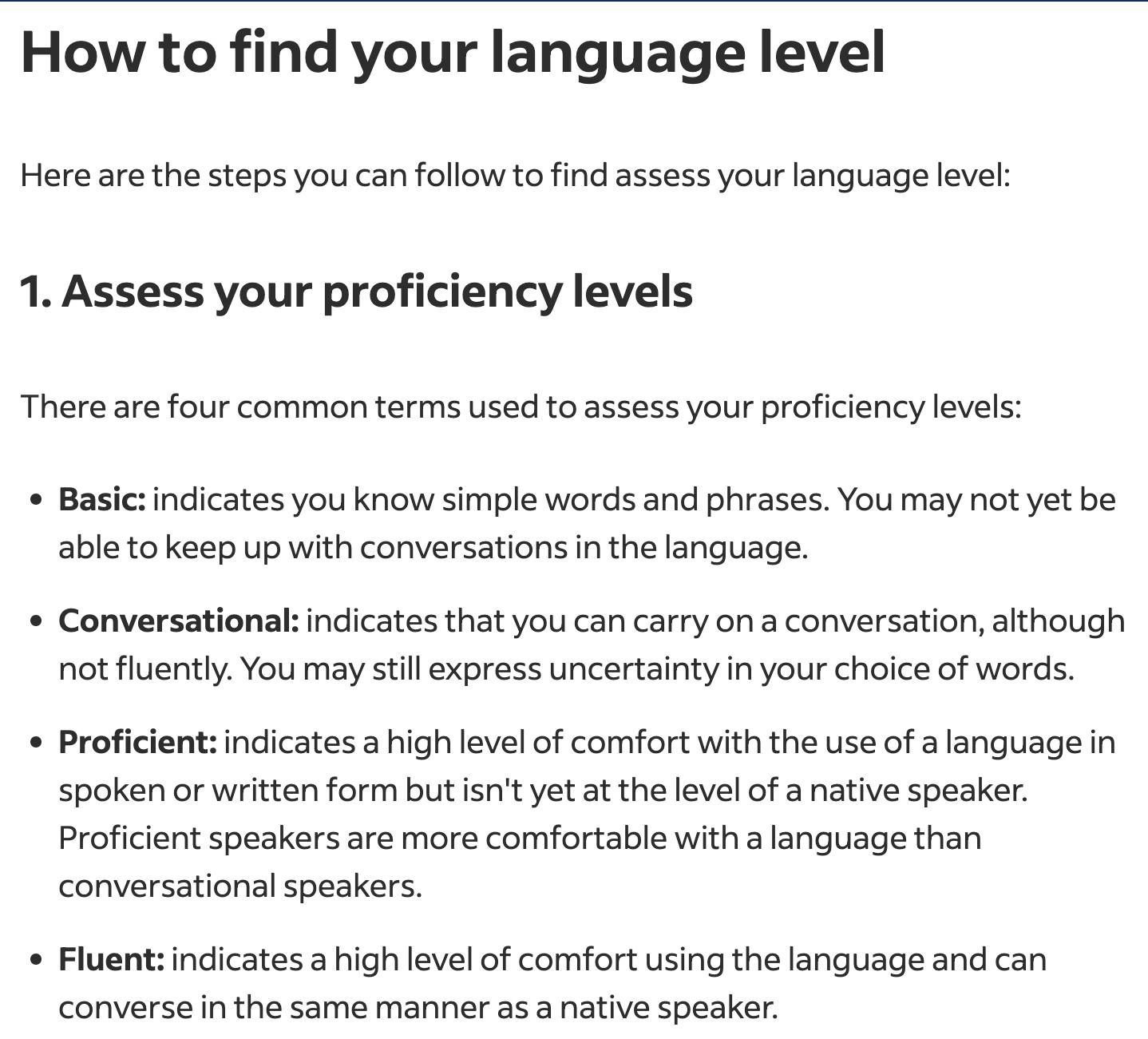
10
Bilingual (이중 언어)
The ability to speak two languages for communication with the facility of a native speaker. Spoken, written, or containing similar information in two different languages. It also refers to the coexistence of more than one language system within an individual, as contrasted to monolingualism.
You speak two languages your native language and a secondary language.
Gyopo (교포)
The term gyopo refers to persons of Korean ethnic descent who have lived the majority of their lives outside Korea, or simply, any Korean who lives outside Korea. Korean Americans (한국계 미국인) are Americans of Korean ancestry. I am considered a gyopo since I am Korean American.
As of 2023, Korean Americans made up about 0.6% of the U.S. population, numbering approximately 2 million people. They're the fifth-largest subgroup within the Asian American community, following Chinese Americans, Filipino Americans, Indian Americans, and Vietnamese Americans.
Hangul (한글)
Hangul is the official writing system in South Korea and North Korea (where it is known as Chosŏn’gŭl (조선글)), and it is used by diaspora Koreans across the world. It is made up of 14 consonants and 10 vowels, for a total of 24 letters. The development of the Hangul alphabet is traditionally ascribed to Sejong, fourth king of the Chosŏn (Yi) dynasty; the system was made the official writing system for the Korean language in 1446 by one of Sejong’s decrees. Until the 20th century, the script was generally known by the name Sejong gave it, Hunminjeongeum (훈민정음); translates to, “Proper Sounds to Instruct the People.”
11
Conversational (대화하는 수준)
This indicates that you are capable of carrying on a conversation, but not fluently. You may still express uncertainty in your choice of words.
I would define my skills as conversational. However, that doesn't mean that it is limited to speaking. I can read and write it as well, just at varying levels.
Konglish (콩글리시)
Konglish, more formally Korean-style English, is a style of English used by Korean speakers. The name is a portmanteau of the names of the two languages and was first recorded earliest in 1975.
Korean + English = Konglish
Konglish is comprised of English loanwords that have been appropriated into Korean and includes many that are used in ways that aren't readily understandable to native English speakers. Konglish also has direct English loanwords, mistranslations from English to Korean, and pseudo-English words coined in Japan that came to Korean usage.
Fluency (유창함)
Fluency is the flow of one’s speech. It stems from the Latin word “fluere,” which means “to flow.” Someone fluent in a language can easily string words together into coherent thoughts. The words will form a followable rhythm without sporadic starts and stops. In other words, the language flows from the speaker with relative ease they don’t stumble on their words when trying to form a logical phrase or sentence.
12
02 Experiences
Each language you speak is a thread that weaves a richer tapestry of your identity.
13
Photos by Cynthia Park
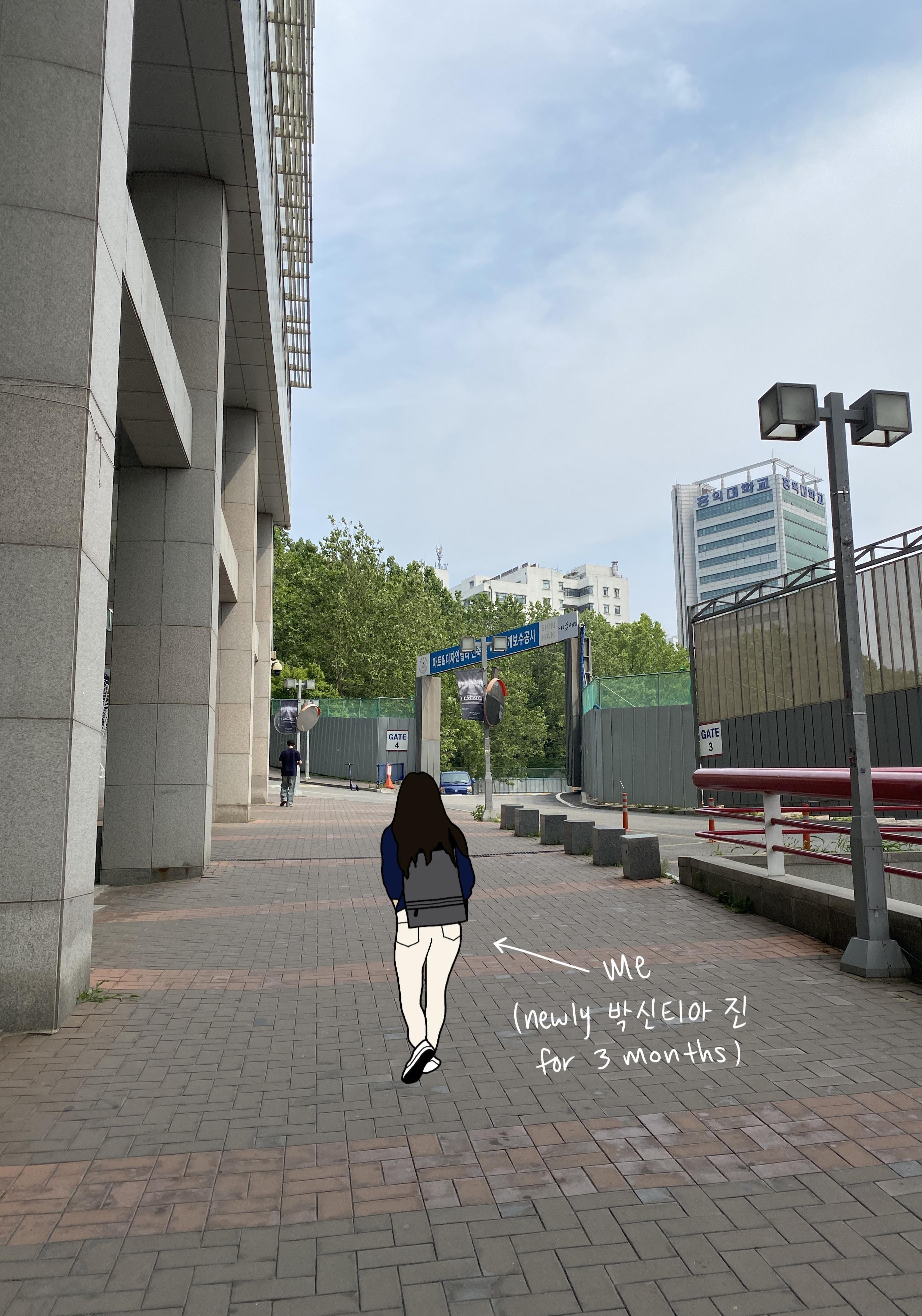
With
a trembling and nervous heart
14
떨리고 긴장되는 마음으로
Study Abroad at Hongik University
Spring 2023
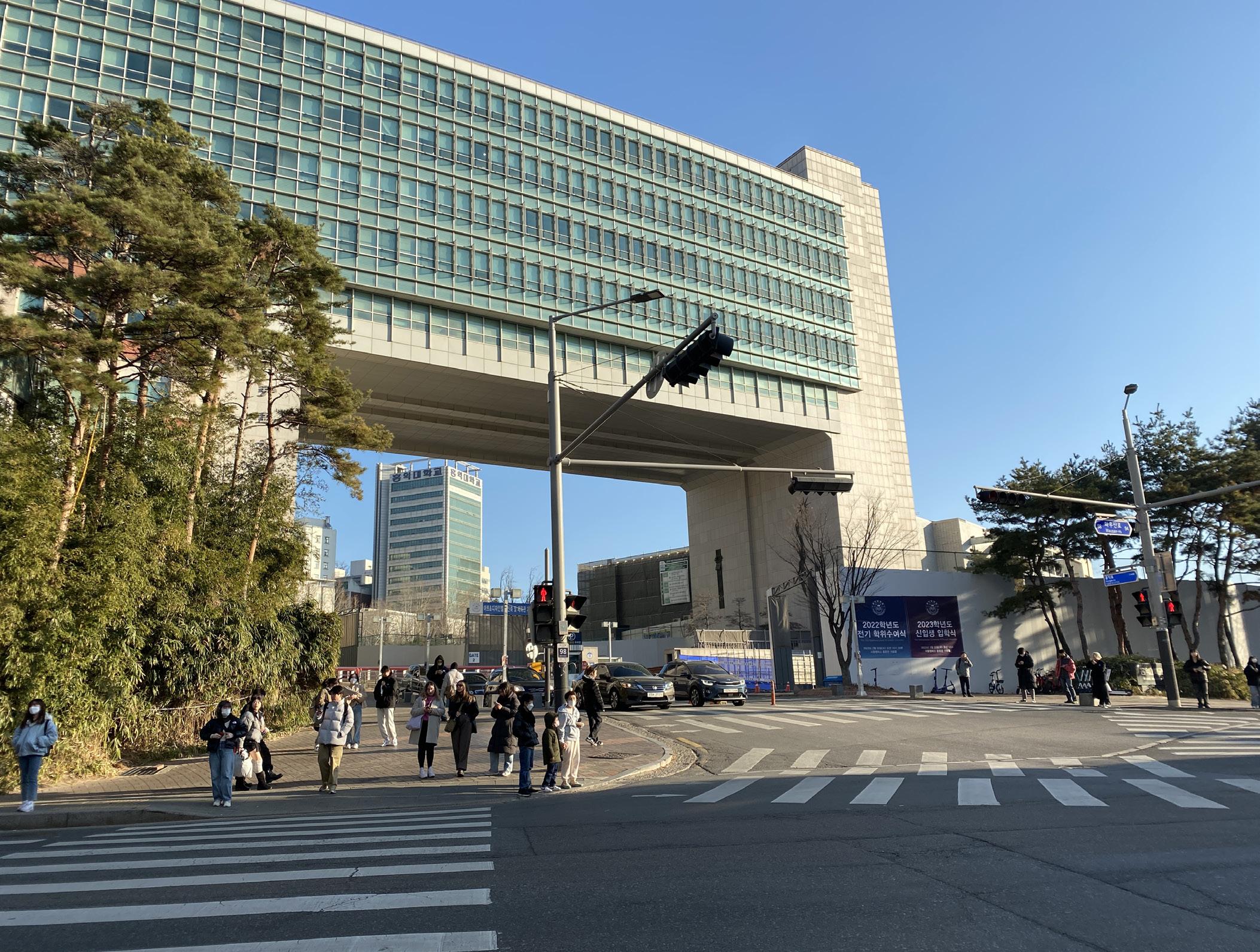
I sat there and
thought for a moment. I had an epiphany. I didn't know exactly how to describe my skill level.
15
I was an exchange student at Hongik University in South Korea for one semester. At that time I believed that my Korean skill was decent, so I took up the challenge and enrolled in several classes that were taught in Korean.
It was the first week of the semester on a Thursday afternoon. I walked into the classroom for the class “Practice Design Studio.” When the professor entered, she introduced herself and the class to everyone. Then, she handed out pieces of construction paper and markers, asking us to write our names on them. She carefully examined each name tag and paused when she saw mine, which said, “박신티아진” my full English name spelled out in Korean and asked me how to read it. Most names in Korean consist of only three syllables, including the last name, for example, "박진아", so it

would be normal for her to react that way when I may not look like a foreigner at first glance.
After I informed her of my name, she proceeded to ask me where I was from. I told her I was from the United States (specifically New York), to which she then asked me about the extent of my Korean skills. I sat there and though for a moment. I had an epiphany. I didn't know exactly how to describe my skill level. In my mind I was thinking, It’s definitely not beginner, nor do I think it’s intermediate since I know some “upperlevel” things…but it’s not exactly advanced either because there are some basic level things that I don’t know… Getting nervous for being put on the spot, I ended up responding by saying, “애매해요” (It’s ambiguous vague).
That was the first regret of the semester.
Photos by Cynthia Park
wasn’t confidently Why wasn’t I able confidently to able
Because if we’re being completely honest, it’s true. If you were to ask me that question again today, I still wouldn’t know how to respond.
17
18
didn't have the confidence to answer otherwise. able to respond the professor? able to respond
I
Job Applications
A simple question like this left me contemplating for a while.
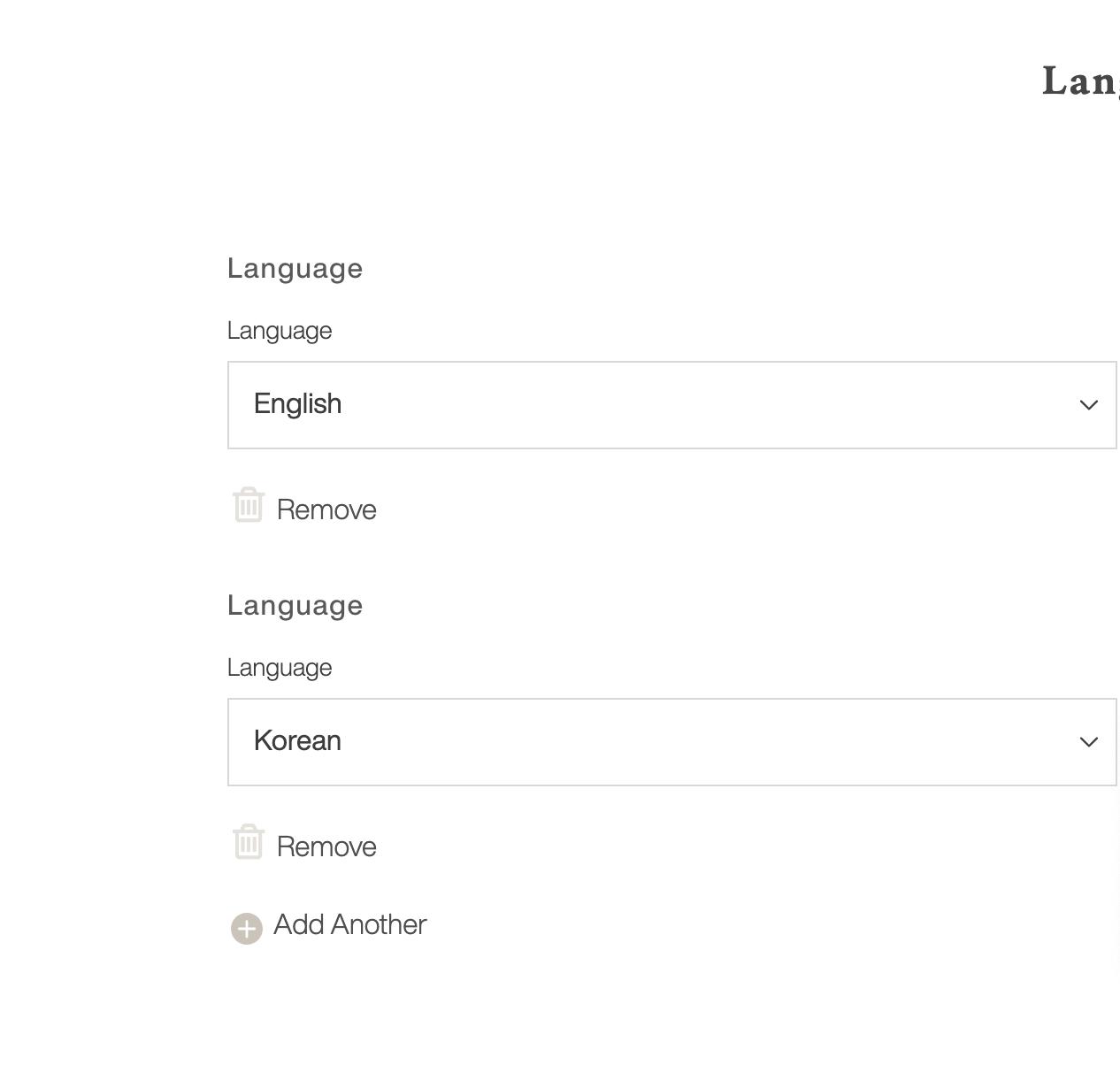
19

20
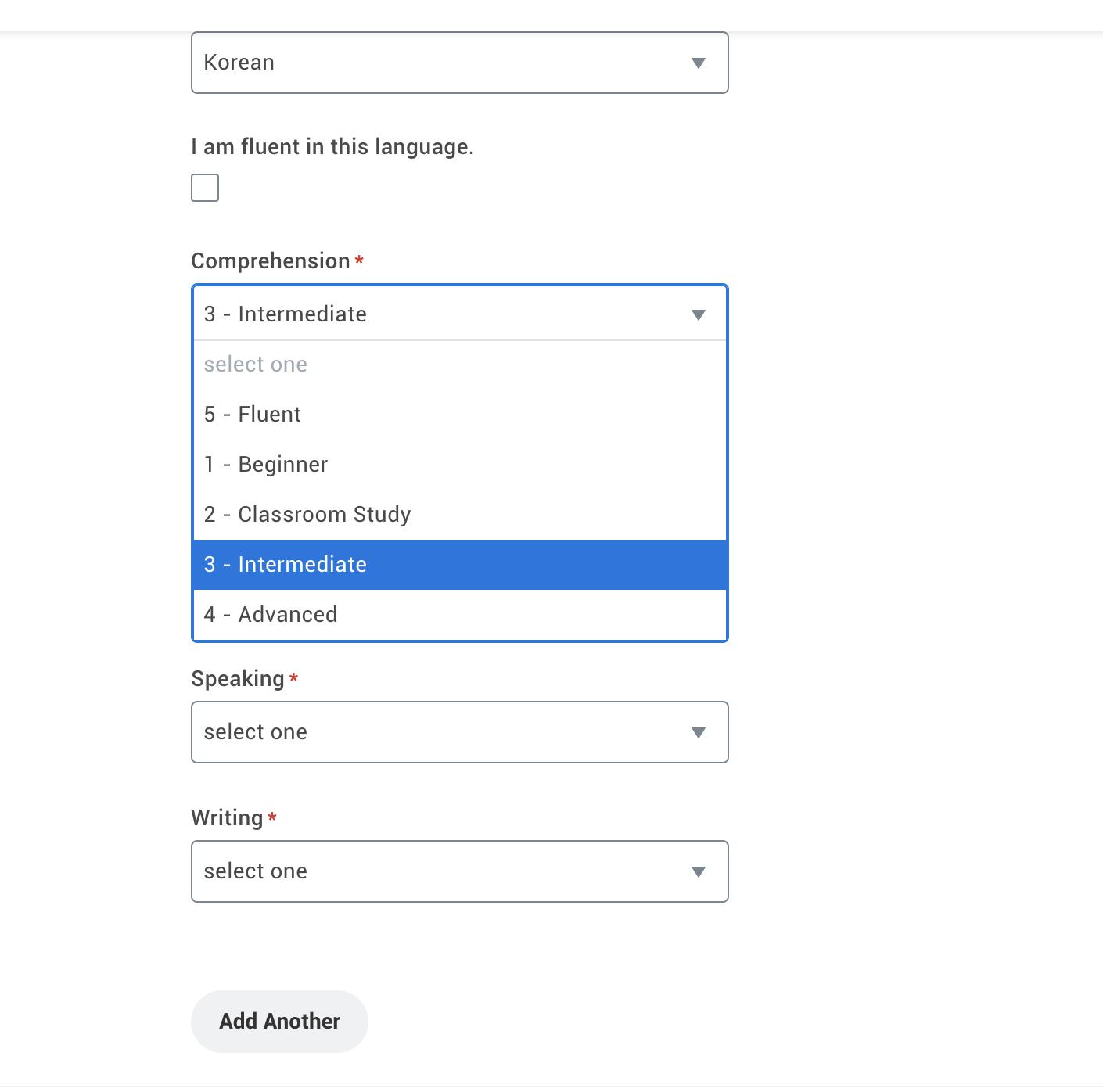
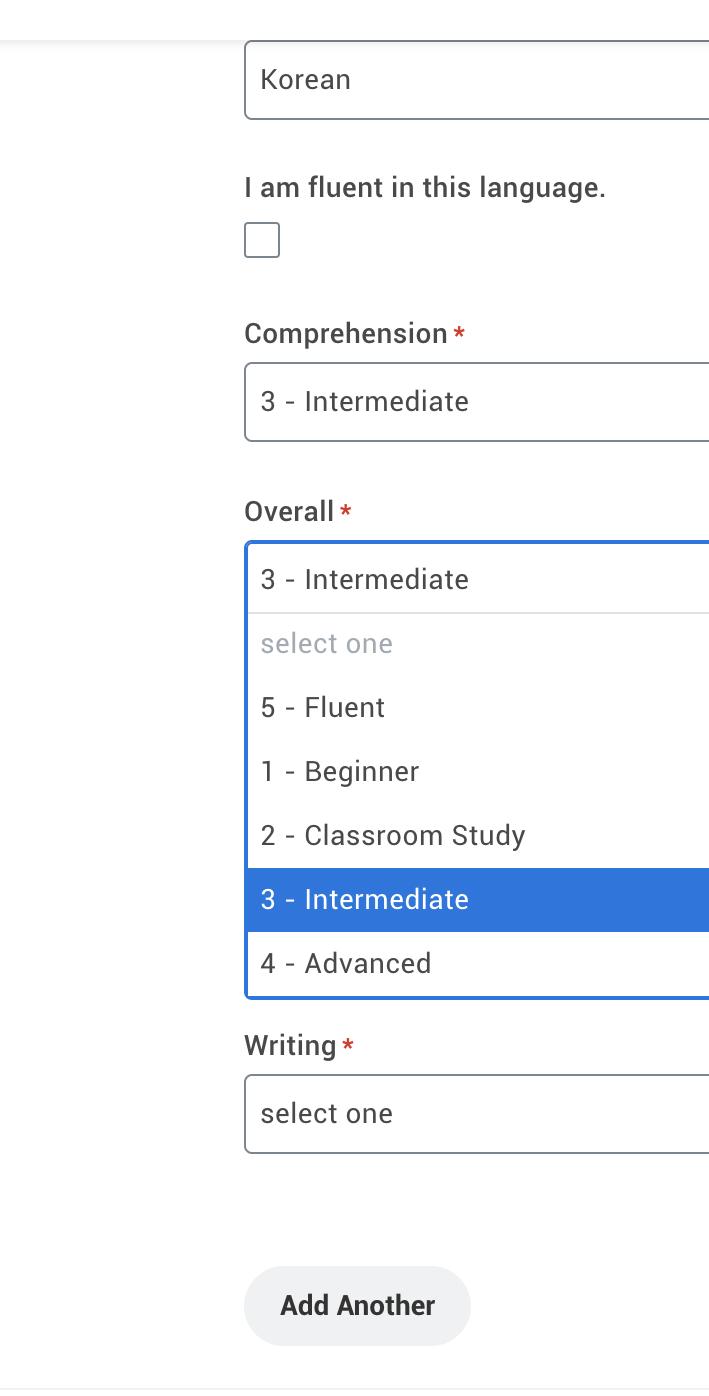


21

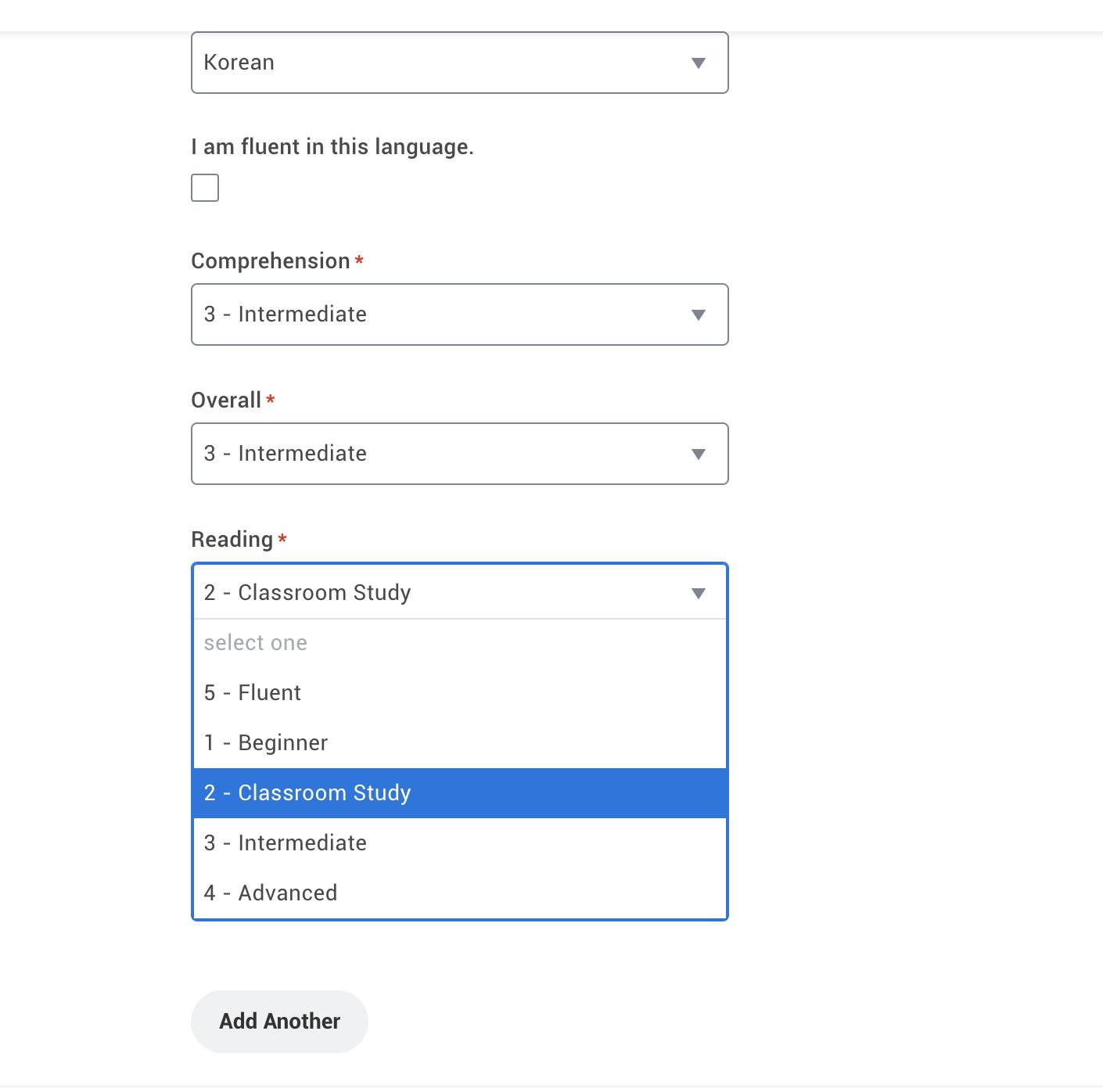
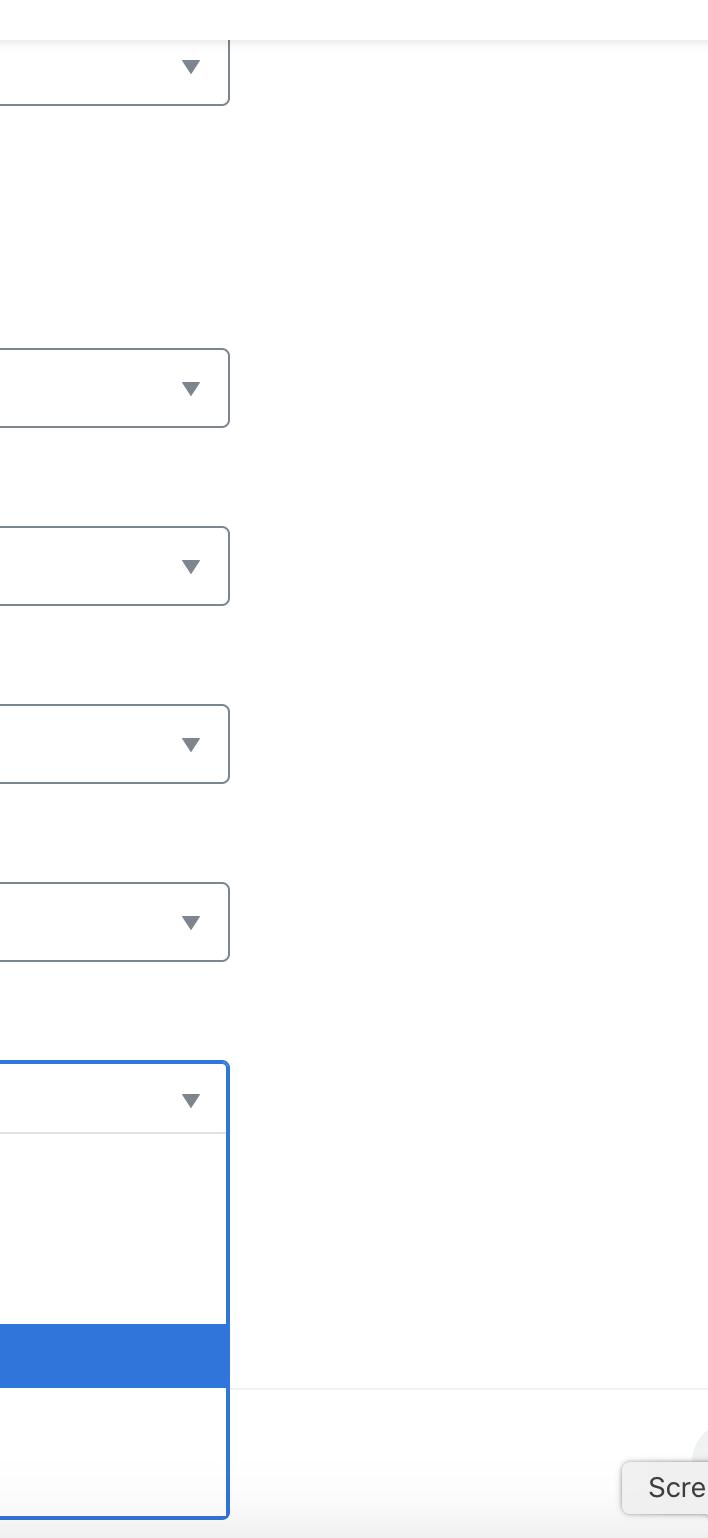
Not all places use the same terms, which can be confusing and may lead to an inaccurate indication of one's skill level, especially when you are uncertain about it.
22
03 Background
Your background is a bridge connecting you to the world.
23
How did I learn Korean?
I am a Korean American whose native language is English. I am fortunate that my parents are highly proficient in English, which naturally led me to speak it as my primary language while growing up. Korean, on the other hand is my second language. I don't use it as often, only in certain situations, such as when I have to communicate with my grandparents. Since there weren't many diverse chances where I had to speak Korean, I was not proficient when I was young. It hasn’t been very long since I became “good” at the language
I remember my grandpa saying to my sister and I, “Why can't you speak Korean well? You're Korean; you should know how to speak the language.” At that time, I was very young and didn’t know any better.
24
It started with Korean school...
Like many gyopos, I attended Korean school (한글학교) when I was in elementary school. Although I attended for several years, my skills didn't improve drastically. Although I tried hard, if I were to be honest, I would barely retain what I learned that day, and I wouldn't do very well on my tests. Sometimes I wondered why I was still attending if I wasn't really getting better. In fact, I attended two different Korean schools, both of which were part of the churches I was attending at the time. While I did improve somewhat between each Korean school, I was nowhere near the skill level that I am at now.
25
So, then how did I become “good”?
How did I get to the skill level that I am at now? While I do think that my time at Korean school served to be helpful to some extent, I believe that there was another reason that really helped me become proficient.
Growing up, I was interested in Korean culture because it is a part of my background and identity. I was especially interested Korean media, such as K-pop and K-dramas. I would immerse myself in the culture by listening to Korean music and watching Korean shows, most importantly, with English subtitles. Even if I didn’t fully understand what the people were saying or what was going on, I would still hear the language and be able to follow along with the English subtitles, if available. Naturally, I began picking up the language, and this became my way of improving upon it once I stopped attending Korean school.
26
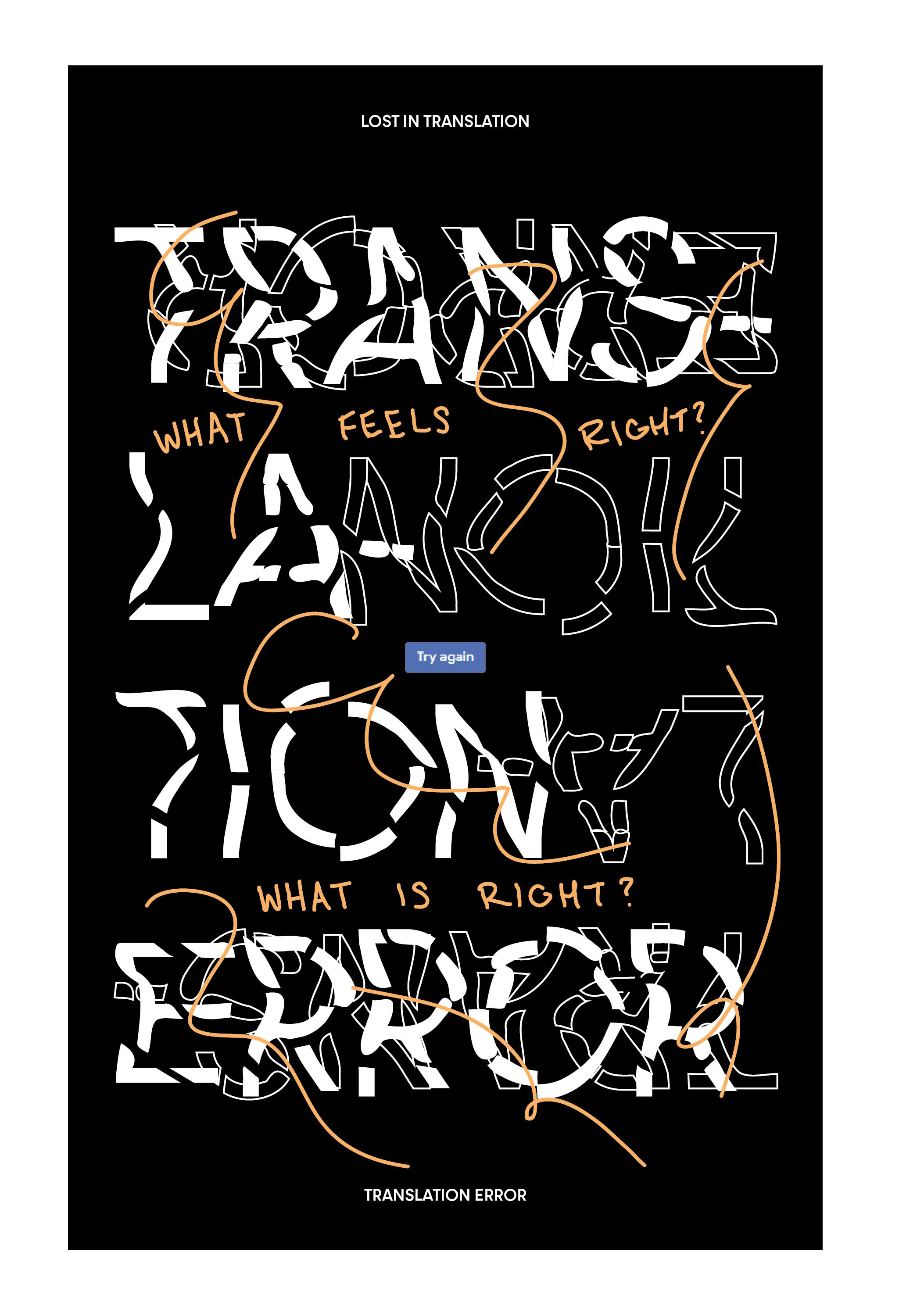
04 The Struggles
A constant balancing act, where the weight of two languages rests upon one tongue.
28
Do you think in English or korean?
If you asked me this question when I was younger, I would have said English without any hesitation.
But if you ask me now, I would say both.
29
Both
Isn’t it fascinating that you can mix multiple languages in a conversation and still understand each other?
I still think primarily in English, but there would be some moments when my mind would 갑자기 (suddenly) switch to Korean, like this. It could be a word, a phrase, or multiple sentences. It depends on who I talking with.
The more proficient the other party is at Korean, the more likely I am to think or speak in that language. It may sound confusing from an outside perspective, but it makes complete sense when you are the one living through the experience it comes naturally.
30
Understanding How My Brain Works Unde How
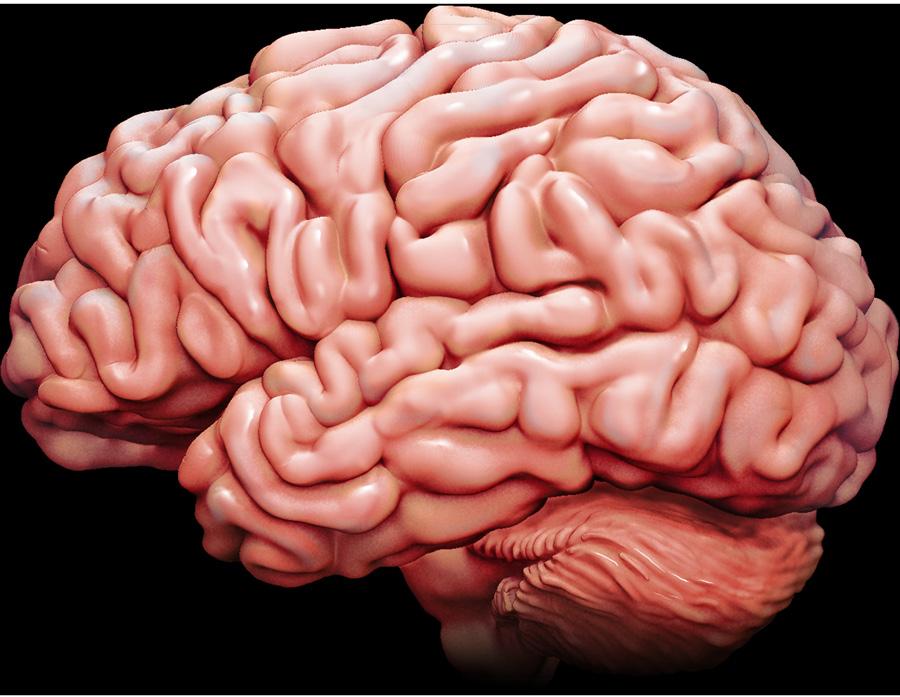
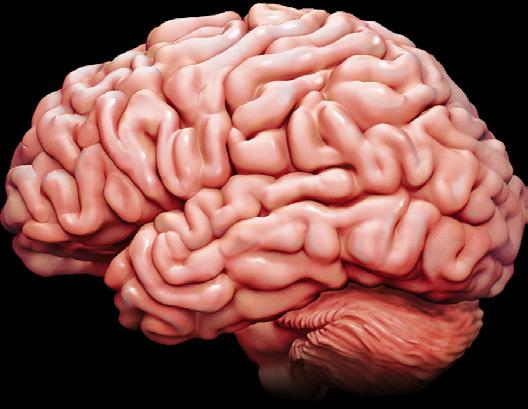

31
Understanding Works
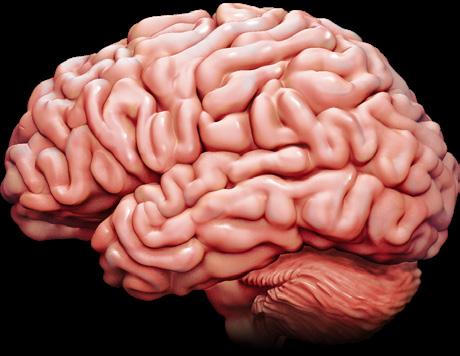



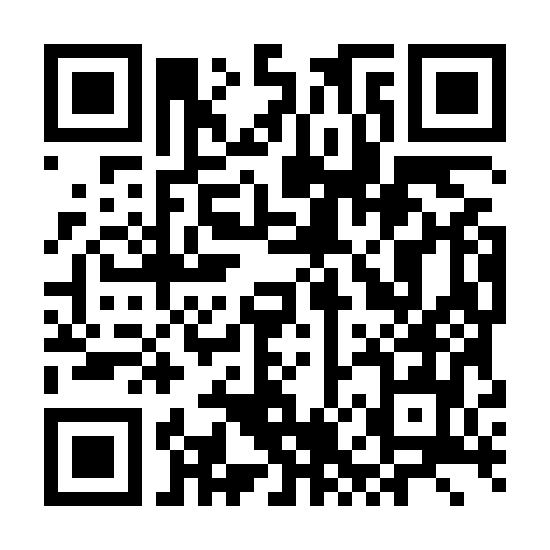
So you think you’re bilingual:
English vs Korean
33
05
A doubled edged blessing
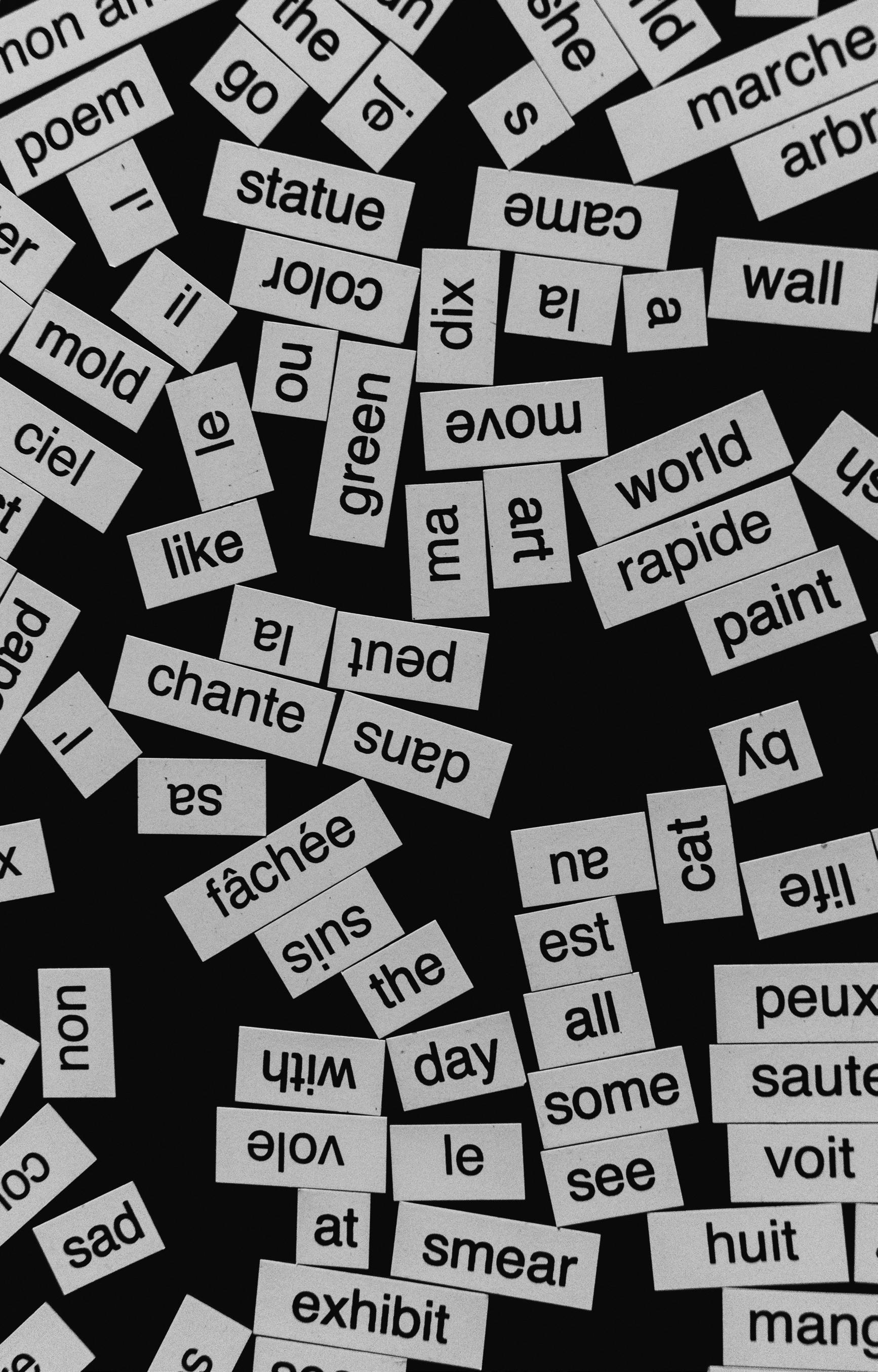 Photo by Aedrian on Unsplash
Photo by Aedrian on Unsplash
CONFI DENCE OR CONFI-DENCE
자신감
The belief in oneself and one’s powers or abilities; self-confidence; self-reliance; assurance.
One key to being “good” at a language is confidence. A lack of confidence usually stems from the fear of making mistakes. If you don’t try to put the new language into use then you will never learn from your mistakes. This is the problem I have when speaking Korean. I doubt my skills and sometimes overthink what I want to say, so I end up not being able to fully convey everything that I want to say.
My lack of confidence hinders my ability to become fluent in the language. This makes me seem like I am less proficient than I actually am.
36
I am trying to lessen the gap between these qualities.
PERSONALITY , VOICE , AND BEHAVIORAL CHANGES
Your Personality
성격, 목소리, 행동 변화
Does your personality change when you speak a different language? Personality is the combination of characteristics or qualities that form an individual’s distinctive character. Whether you’ve noticed it or not, research suggests that our personalities can shift depending on the language we are speaking. Experts at Stockholm University say that your attitude to a language and the cultural values you place on it play a part in how you label your personality when speaking that language. “Your own attitudes towards a culture and a language come into play, and what you associate with that culture. This might make you act differently and feel differently when you speak," says Klara Skogmyr Marian, an author and assistant professor and researcher at the Centre for Research on Bilingualism at Stockholm University. "How others perceive you, your culture, and the languages you speak might also affect how you feel yourself." It also depends on who you are talking to, the context of the conversation, and how confident you are in the language.
Your Voice
What about your voice? Studies show that learning a new language forces you to account for differences in etiquette, produce unfamiliar sounds, and even question your confidence. All these factors can affect your voice. According to Kati Järvinen’s PhD study “Voice Characteristics in Speaking a Foreign Language: A study of voice in Finnish and English as L1 and L2” found that pitch rises when speakers articulate a foreign language, causing more strain to the voice cords.
“It appears to be the case that when you speak a foreign language, you speak it in a different way than your native tongue. Vocal cords close more tightly, and produce a more pressed sound. The tenser muscles then increase the vocal load,” says Järvinen.
38
이중 언어 vs 유창함
If you can speak more than one language, does that automatically make you bilingual?
The human brain not only has evolved to accommodate a single language but also is, in fact, suited to acquire more than one language, such as the case of bilingual and multilingual individuals. As globalization advances, more people become bilingual or multilingual thus establishing bilingualism as the standard rather than the exception (Grosjean & Li, 2013). A bilingual individual may achieve different levels of proficiency in the two languages, using both languages in different contexts, by learning a new language following educational requirements, immigration, or alternative circumstances. By this definition, a bilingual individual isn't only necessarily someone who has acquired both languages from birth, or early in life, but also that one who learns a second language (L2) later in life.
39
BILINGUAL VS FLUENT
Do people falsely consider themselves to be bilingual or multilingual when they aren't truly fluent in the other language(s)?
40
DREAMS
There have been very few studies on bilingualism and multilingualism and how they affect dreams. Studies find that people who speak any second language, even without good proficiency, at least occasionally dream in the second language. One study asked the subjects what they thought made the difference, and they said that it was determined by the people and or the setting that was being dreamed about. If you thought of your family back in your country of origin, it’d likely be in that language regardless of whether it was now your dominant language. And if you were dreaming about people you’ve known as a young adult, living in another setting where you spoke a different language, you’d be dreaming in that language. It was combination of where the dream was set, what language was associated with that, and what people were in the dream that’s what they said determined it.
There are some people who say they're never aware of language in dreams that they don’t dream in any particular language. Most of the time they don’t hear language in their dreams. Some studies that say that your degree of proficiency in a second language determines how often you will dream in it. People who aren't proficient in a foreign language sometimes say that they have once or more dreamed in the rudimentary second language, and in the dream, they believed they were very proficient in it. When people discuss it, it’s usually along the lines of “Why is it that we can be so much more fluent in our dreams?” Dream psychologists, especially neuroscientists, say that it’s likely because the prefrontal area that is responsible for reality checks is shut down. It is possible that they are more proficient in the dream, but it’s also possible that they feel more proficient in the dream because they’re not doing the usual self-judgment.
42
꿈

I try hard to focus my thoughts in one language, but it's not always easy.
 Images created with Stable Diffusion
Images created with Stable Diffusion
06 Conclusion
Bilingualism: the art of finding balance in words.
45
Photo by ibmoon Kim on Unsplash
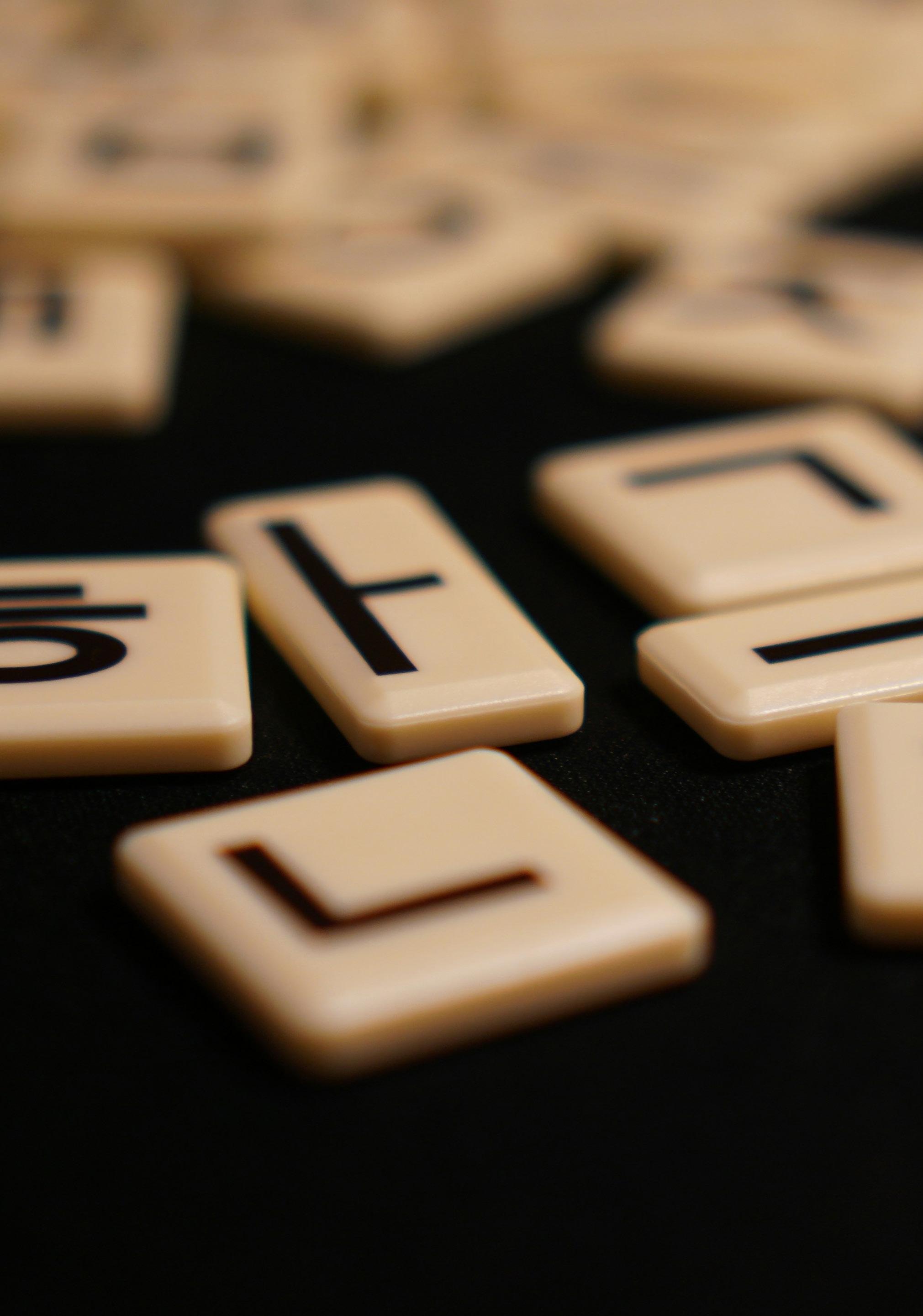
In a world that is increasingly interconnected, being bilingual is becoming more valuable and relevant than ever before. It broadens horizons, enriches experiences, and enables individuals to navigate a diverse and globalized society with ease. The fact that I am able to speak more than one language (at fairly decent skill levels) is something that I like to pat myself on the back for. Even with all these drawbacks, I believe that the advantages weigh more/are much more significant/are much more valuable/hold much more value.
Bibliography
"The 3rd Language Between Korean and English: KONGLISH | Korean Pizza Club | EP.22." YouTube, uploaded by Korean Pizza Club, November 10, 2023. https://www.youtube.com/ watch?v=tz9pvwublA4&t=606s
Aedrian. a large group of white and black letters. April 24, 2022. Unsplashed. https://unsplash.com/ photos/a-large-group-of-white-and-black-letters-aNVx2FpKAF8.
“Bilingual Definition & Meaning.” Dictionary.com. Accessed October 2, 2023. https://www.dictionary.com/ browse/bilingual.
“Bilingualism.” Bilingualism - an overview | ScienceDirect Topics, n.d. https://www.sciencedirect.com/ topics/medicine-and-dentistry/bilingualism.
Byers-Heinlein, Krista, and Casey Lew-Williams. “Bilingualism in the Early Years: What the Science Says.” LEARNing landscapes, 2013. https://www.ncbi.nlm.nih.gov/pmc/articles/PMC6168212.
Chung, Soojin. “History of Korean Immigration to America, from 1903 to Present.” History of Korean Immigration to America, from 1903 to Present | Boston Korean Diaspora Project, n.d. https://sites.bu.edu/ koreandiaspora/issues/history-of-korean-immigration-to-america-from-1903-to-present.
Gwhite, and Gosia Jaros-White. “Fluency vs Proficiency - LTI Blog.” LTI Blog - Certify your language skills anytime, anywhere., March 13, 2023. https://www.languagetesting.com/blog/fluency-vs-proficiency/.
“Hangul.” Encyclopædia Britannica, September 29, 2023. https://www.britannica.com/topic/HangulKorean-alphabet.
“How to List Language Levels on Your Resume (with Examples) | ...” Indeed, August 8, 2022. https://www. indeed.com/career-advice/resumes-cover-letters/language-levels-resume.
47
Kim, ibmoon. a close up of a number of letters on a table. November 21, 2021. Unsplashed. https:// unsplash.com/photos/a-close-up-of-a-number-of-letters-on-a-table-aE0cs1HtBgA.
“Korean Diaspora.” New World Encyclopedia. Accessed October 25, 2023. https://www. newworldencyclopedia.org/entry/Korean_diaspora.
Nordin, Pia. “Hej, Hello, Hola: Does Your Personality Change When You Speak Another Language?” Stockholm University. Accessed October 25, 2023. https://www.su.se/centre-for-research-on-bilingualism/ news/hej-hello-hola-does-your-personality-change-when-you-speak-another-language.
Person. “The Language of Dreams.” Harvard Gazette, January 30, 2023. https://news.harvard.edu/gazette/ story/2022/05/when-you-speak-15-languages-which-do-you-dream-in.
“Speaking Korean vs English with Johnny #daebakshow #divestudios #johnnynct #shorts #NCT #ericnam.” YouTube, uploaded by DIVE Studios Fan, June 16, 2023. https://www.youtube.com/watch?v=mW4ItxxtBhY& list=PLRT8V2XQl7SN2N0AJzQwx-FeSCmch7KDz&index=2&pp=gAQBiAQB.
“Study: Speaking Foreign Languages Strains Vocal Cords.” News, May 12, 2017. https://yle.fi/a/3-9609774.
“‘you’re American Eric !!’ #shorts.” YouTube, uploaded by DIVE Studios / 다이브 스튜디오, February 17, 2024. https://www.youtube.com/watch?v=pvhauIaI8zs&list=PLRT8V2XQl7SN2N0AJzQwx-FeSCmch7KDz&index=1 &pp=gAQBiAQB.
“북미즈 혼돈의 2개국어 #마크 #쟈니.” YouTube, uploaded by 우리칠클럽, April 26, 2023. https://www.youtube. com/watch?v=1az2IG-Sapk&list=PLRT8V2XQl7SN2N0AJzQwx-FeSCmch7KDz&index=4&pp=gAQBiAQB.
48
네? Yes?
49
When someone says something that we don’t understand, catch, or misheard, we say “What?” or “Huh?” In Korean, we say “네?” This literally translates to “Yes?” (polite), but it more closely means “Huh?” (in a polite way). This is one of those things that can be confusing when translated in English, but makes complete sense if you understand Korean.
50

 CYNTHIA PARK
CYNTHIA PARK






















 Photo by Aedrian on Unsplash
Photo by Aedrian on Unsplash

 Images created with Stable Diffusion
Images created with Stable Diffusion

